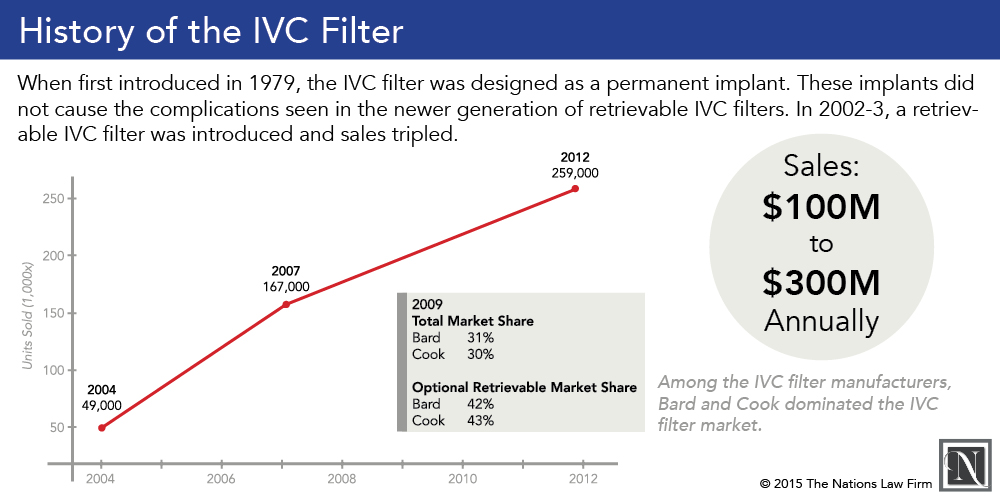- – Studies show 1 out of 4 IVC Filters fracture, potentially causing death
- – IVC filters are supposed to prevent blood clots like pulmonary embolism and deep vein thrombosis
- – IVC Filters are implanted to limit where blood clots can travel in the body and prevent strokes
- – An IVC filter can fracture and be carried away by the blood stream into the heart or lungs
- – The likelihood of splintering increases the longer the device remains in the body
JURY AWARDS $3.6 MILLION IN FIRST BARD IVC TRIAL
On American Lawyer: Attorneys Howard Nations and Mike Papantonio discuss C.R. Bard, the medical device company peddling a potentially deadly anti-blood clot device. Both lawyers agree that we can no longer rely on medical device companies to do what is best nor can we depend on the FDA to properly regulate these devices.
Watch the eight-minute program with highlights of an appearance by Howard L. Nations on Free Speech TV Ring of Fire, illustrating the current IVC (Inferior Vena Cava) Filter litigation.
Howard Nations and Ring of Fire’s Farron Cousins discuss the inquiries that are being raised regarding a medical device implanted in thousands of Americans who are at risk for blood clots. Recent studies indicate that these devices may cause more harm than good.
IVC filters have been linked to a high rate of fracture, and other serious side effects. Unfortunately, they can only be removed successfully in about half of the cases. The FDA has warned IVC filters that are left in patients have a high risk of severe, life-threatening injuries. Many people have suffered through multiple surgeries to correct problems with this device. Several device companies manufacture these IVC filters, including Bard and Cook.

Serious side effects of IVC filters may include:
- Filter fracture (pieces can injure the heart, lungs, or inferior vena cava)
- Device migration (device may become ineffective, or erode into the body)
- Device erosion
- Cardiac tamponade (a condition where fluid builds up in the space around the heart and interferes with heart function)
- Perforation of the inferior vena cava, heart, lungs
- Deep Vein Thrombosis
- Blood clots may clog the filter, slowing blood flow into the lungs
- Irremovable IVC filter
IVC filters are placed in patients:
- diagnosed with deep vein thrombosis (DVT).
- with pulmonary embolus.
- who are trauma victims.
- who are immobile.
- who have recently had surgery or delivered a baby.
- who will soon have surgery and are at risk for clotting.
- who cannot be successfully treated by other methods, including blood thinning agents.

Since the introduction of the IVC filter in 2005, the FDA has received approximately 1000 adverse reports concerning them. Many of the reports allege that the IVC filters fragment and embolize within the body. Based upon further information, we think the number of fracture and migration occurrences are much higher and have affected over of 15,000 patients around the country. The FDA issued a warning on August 9, 2010 entitled “Removing Retrievable Inferior Vena Cava Filters: Initial Communication”, which warned against leaving IVC filters in for extended periods of time, because they have a tendency to cause life threatening problems. In a study published in 2012, a 12% rate of filter fracture associated with the IVC filters was found. The researchers also found that the rate of filter fracture increased with the amount of time the implant was in the patient’s body. Unfortunately, just more than 50% of fractured IVC filters could be successfully removed. Although the body of the filter can often be removed successfully, the spider-like legs (or “struts”) often fracture and move to a position where retrieval is impossible.
At The Nations Law Firm we have years of experience in pharmaceutical and medical device litigation. It’s what we do. We have the resources, knowledge, and commitment required to stand up to the drug and device companies and fight for your rights. If you or someone you know may have developed complications after IVC implantation, please contact our offices at (800) 269-3050 for a free case evaluation.
Please fill out the form for a free case evaluation:
If you are an attorney, please click here…
Privacy Policy (opens in a new window)